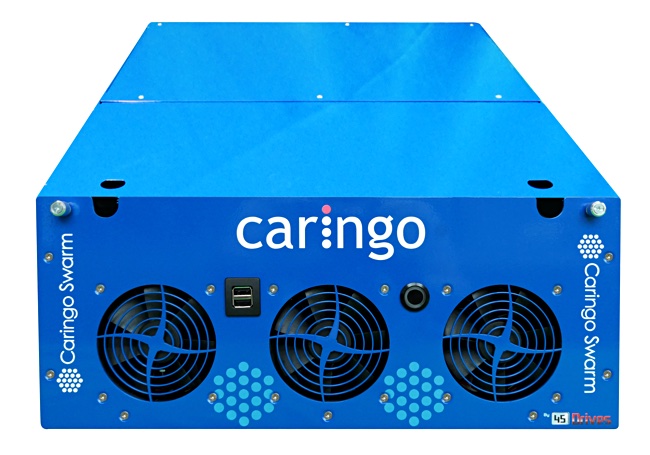Caringo is touting the industry’s fastest aggregate S3 throughput performance with the latest release of its Swarm OS software.
The object storage startup says Version 10 delivers 35GB/sec read and 12.5GB/sec write but it is light on the benchmark details. The company reveals all next month in a white paper that will publishes the specific configuration used to achieve these results.
In the meantime, we have this soundbite from CEO Tony Barbagallo to share with you: “In this specific test [by a customer] we were compared to 5 other object storage solutions and performed better than everyone. We are confident that this is the fastest performance in the industry for S3 read/write throughput. To clarify this is complete throughput operations to the object store. Swarm does not use front-side cache. You will need to ask our competitors how they perform.”
The Swarm
The Swarm OS is a complete object storage stack that runs on bare metal servers. Swarm contains all the software needed in a parallel architecture running in RAM, according to Barbagallo.
He defines parallel in the “sense that all core storage nodes can perform all requests. We store the metadata with the object and the index is held in RAM across all the nodes in the cluster so the system does not need to rely on an external database.”
The company contrasts its software with that of other object-based storage solutions which require an initial Linux install on disk and rely on caching layers and load balancers to enable performance.
Barbagallo told us that such an approach is “expensive in the sense of cost and management effort. Our competitors often use a front side caching unit of some form relying on SSDs that eventually write to the object store.”
Yes, we have an appliance
To coincide with Swarm v10, Caringo has launched a single-server appliance targeted at media and entertainment organisations – specifically post-production houses, studios, broadcasters and small enterprises.

This is a scale-out device and the server hardware has dual Xeon CPUs, 96TB of raw storage capacity (60TB usable), dual 10GbitE NICs, LSI 12Gbit/s disk controller, and dedicated SSDs for boot and search. The server runs Swarm with a core object store, a web-based storage and content management portal, Elasticsearch and VMware ESXi.
Caringo says this single node starter system is a quarter of the entry-level cost of competing object storage systems. The MSRP (manufacturer’s suggested retail price) is $49,995 and includes all software and three years’ support and maintenance.
FileFly v3.0 software now supports AWS, Azure and Google Cloud, providing file tiering from Windows and NetApp. Unlike v2.0 the update is now not dependent on Swarm, according to Barbagallo. You can, he says, tier data “to/from NetApp and Windows File Servers directly to Amazon S3, Azure or Google Cloud. This is for remote site or disaster recovery purposes. The data can be rehydrated in the cloud by running FileFly 3.0 in a virtual appliance on any cloud and retrieving the data.”
Caringo said its SwarmNFS 2.1 software delivers parallel, petabyte-scale sustained streaming of NFS to object. In recent tests on standard hardware, a single instance of SwarmNFS sustained reads of 1.6GB/sec (3PB+ per month) with no caching or spooling.
We asked Barbagallo about this and its configuration. “The NFS files were read from an existing data set within the network. They were streamed into Swarm via NFSv4 going from POSIX compliant data into the object store,” he replied. “I say ‘streamed’ because SwarmNFS is not a gateway or file system emulator. It is a file to object conversion interface which is why we focus on sustained streaming. There is no cache to fill up. If you need more throughput simply add another instance.”
“[The configuration] is the same as the S3 configuration and will be covered in the white paper.“
Roll on November.
+Comment
With a mere $10m in venture funding Caringo is a startlingly different object storage startup from competitors Cloudian, with its $173m funding, and Scality with $152m raised to date. Compared to these large-scale object storage powerhouses Caringo is like an artisan microbrewery – but it could still make great products.
And now the company has turned up the marketing heat with its claim on the fastest aggregate S3 throughput performance and introduction of the single server starter system. This may reflect the influence of Barbagallo, previously VP for products, who became Caringo’s CEO in June 2018 when co-founder Jonathan Ring stepped back to take the CTO role.







